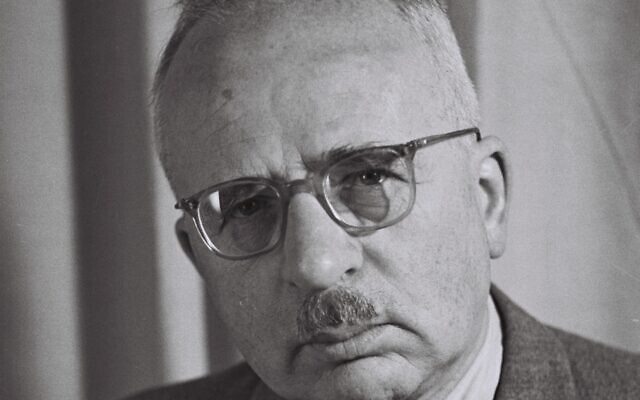Signed, Sealed, Delivered? Pinchas Rosen
Our series continues with Pinchas Rosen – a lover of classical music, an enthusiastic chess player, an avid reader of Goethe, and Israel’s first Justice Minister.
Pinchas Rosen, or Felix Rosenblüth (as he was called in his youth), was born in Berlin in 1887, and grew up in a wealthy family on the Messingwerk estate, some 50 kilometers away. Like nearly all the other Jews in this enclave, Rosen was raised strictly Orthodox. He focused on piano and chess but lacked a true passion until, at the age of 16, a friend lent him a copy of Herzl’s novel “Altneuland.”
From that point on, Zionism burned within him. The goal of creating a utopian, egalitarian society in the Land Israel, as Herzl had imagined, became his life’s mission.
After being wounded in WWI, Rosen became Chairman of the Zionist Federation of Germany, and subsequently moved to Mandatory Palestine in 1923. There, he founded the mostly German-Jewish Aliya Hadasha Party and was elected as its representative to Moetzet HaAm. In fact, not only did he sign the Declaration of Independence, but it was he who commissioned the writing of the text from Mordechai Beham, a young Tel Aviv-based lawyer, in April 1948.
Following the establishment of the State, Rosen – a level-headed centrist – served as Minister of Justice in eight of Israel’s first nine cabinets. In addition, he turned down offers to be elected Israel’s President on not one, not two, but three separate occasions.
As a yekke, he was on the fringe of the mostly Eastern European political gestalt, but being Ben-Gurion’s close and trusted ally, meant that he played a major role in shaping the currently controversial Judicial Selection Committee, as well as the Supreme Court itself, which – during the first few decades of the State’s existence – was heavily populated by those capable of properly pronouncing an umlaut.
Throughout his time in office, he sought to advance a progressive agenda, seeking to strip the rabbinical courts of their judicial power, and pushing, repeatedly, for Israel to adopt a constitution.
When he retired from the Knesset in 1968, he lamented the lack of a single binding document, noting that it would “serve as a blockade against extreme expressions of parliamentary authority.”
In 1973 he was awarded the Israel Prize for his contributions to Israeli jurisprudence, and five years later, in May 1978, he passed away at the age of 91.
The end song is Habib Galbi (lyrics and music – Traditional Yemenite Folk, arrangement – Tomer Yosef), performed by A-WA (Tair Haim, Liron Haim & Tagel Haim). (Licensed by Israel Story through Acum)
About Israel Story: Israel Story is the award-winning podcast that tells extraordinary tales about ordinary Israelis. Often called “the Israeli ‘This American Life,’” we bring you quirky, unpredictable, interesting and moving stories about a place we all think we know a lot about, but really don’t. Produced in partnership with The Times of Israel.
Subscribe to Israel Story on Apple Podcasts, Spotify or wherever you get your podcasts.










